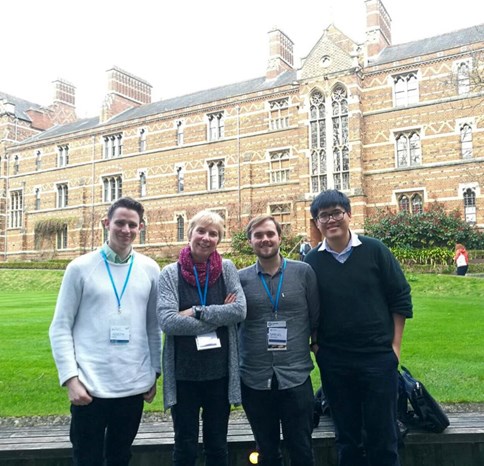Cochrane UK & Ireland Symposium 2017: Through the Looking Glass
Tuesday, 11 Apr 2017
Every year, Cochrane UK organizes an annual symposium for all its networks, including UK- & Ireland-based Cochrane contributors, researchers, health professionals, students, charities, patient advocates, and other interested groups. This year's symposium took place at Keble College, Oxford on the 14th and 15th March 2017. The theme was ‘Cochrane: Through the Looking Glass’. Four Cochrane Infectious Diseases Group (CIDG) members attended the symposium: Joseph Pryce, Vittoria Lutje, Sam Johnson, and Leslie Choi (pictured L-R above). Here, Leslie, Joseph, and Vittoria report on their highlights of the 2-day event.
Leslie Choi
This was my first ever Cochrane UK & Ireland Symposium. It came at an opportune time since I only joined the CIDG in February 2017 and the event was perfect for meeting people from other groups. The Symposium meant I could finally meet with Vittoria – our Information Specialist – in person, someone who I had only had contact via email beforehand.
The overall experience was informative with high quality workshops but two were particularly helpful: one on how Cochrane reviews can inform future trial designs and another on common mistakes in meta-analysis. The former was surprisingly statistical in its content but taught me skills that are especially relevant for some of the reviews I am working on. The latter was more general but gave me a list of things to watch out for when I am conducting my own meta-analyses. The plenary talks were very good and I enjoyed Tim Harford’s one so much so that I am catching up with the back catalogue of his BBC Radio 4 ‘More or Less’ whilst I work in the office.
Joseph Pryce
This year’s symposium, which was largely centred on the future of Cochrane reviews, was an inspiring event to attend. It was great to be involved in discussions on how Cochrane can respond to changing needs in order to continue providing the highest quality and most relevant information for healthcare. There were many methodological workshops to choose from. The ones that I found to be most interesting included a workshop on the challenges of adaptive trial designs (and how to handle them), and another on how Cochrane reviews can and should influence the design of future trials.
I particularly enjoyed that many workshops were designed to enable contributions from all those in attendance. Having only joined the CIDG the previous month, I found it interesting to hear about the obstacles other Cochrane authors had encountered and how they had overcome these issues. The evening banquet, held in the spectacular Natural History Museum, was a further great opportunity to connect with authors from other Cochrane Review Groups and to learn about the systematic reviews that have been undertaken across the UK and Ireland and how these have helped shape healthcare policy.
Vittoria Lutje
The theme of this Cochrane UK & Ireland Symposium was “Through the Looking Glass” – a reference to Oxford as the birthplace of Alice’s Adventures in Wonderland but also, in the context of evidence synthesis, an invitation to reflect on the changing times we live in, and the many possibilities the future brings. All this took place in the beautiful setting of Keble College, with its characteristic polychromatic brickwork buildings and spacious quads. And lovely college meals as well…
My first engagement was the Cochrane Information Specialist (CIS) meeting, which took all of the morning of Tuesday 14th March – I also took the minutes. Main topics on the agenda were as follows.
- An update on the Centralised Search Service and Enhanced Cochrane Library (Ruth Foxlee): incorporating records from various databases (WHO ICTRP, CINAHL, LILACS) into the CRS will go ahead eventually but each source presents different requirements that all take time. The Enhanced Cochrane Library project is also taking longer than expected because of problems with the company developing it.
- More news from the Cochrane Linked Data and Gates project update (Chris Mavergames and Deirdre Beecher), which includes the PICOfinder, PICO Annotator, and annotation of Review backlog. This is a massive project that will require every Cochrane review to be “annotated” using a prespecified controlled vocabulary. Some pilot work has been done with a couple of Cochrane Groups and procedures are being put in place, but much more is needed in terms of consistency of terms and categories. And, of course, it’s yet to be decided who will do all the backlog annotation of older Cochrane Reviews.
- Other short presentations during the CIS meeting focused on Cochrane governance, Cochrane membership, and the CIS Support Team, before wrapping up the morning with a general discussion on more technical themes relevant to Information Specialists, such as the identification of non-RCTs and a comparison between review software programmes.
Workshops and plenaries: some of my favourites were the following.
- A lively plenary talk given by Tim Harford, a senior columnist for the Financial Times and BBC R4, about “Statistics in a post-truth world” – how numbers can be manipulated and twisted (by the tobacco industry for example, or by current politicians), and the need for scientists to involve the public with good stories and an understanding of their methods and results.
- Cochrane response (Rachel Marshall): working in collaboration with Cochrane groups to meet the need of users, and this can include the World Health Organization (WHO) needing guidelines, or groups needing targeted review updates.
- Machine learning tools workshop (James Thomas, co-lead of the Cochrane Project Transform Project Executive: a heavy duty workshop, and just after lunch! But of great relevance to information specialists as it discussed automation in systematic reviews production and especially in study identification.
- Open Trials: a talk and demonstration of the beta version of this new, linked database for all clinical trials. A good source that needs some refining, but promising and relevant for all kind of users (not only Cochranites).
The full videos of all the UK & Ireland Symposium 2017 plenaries are available here
